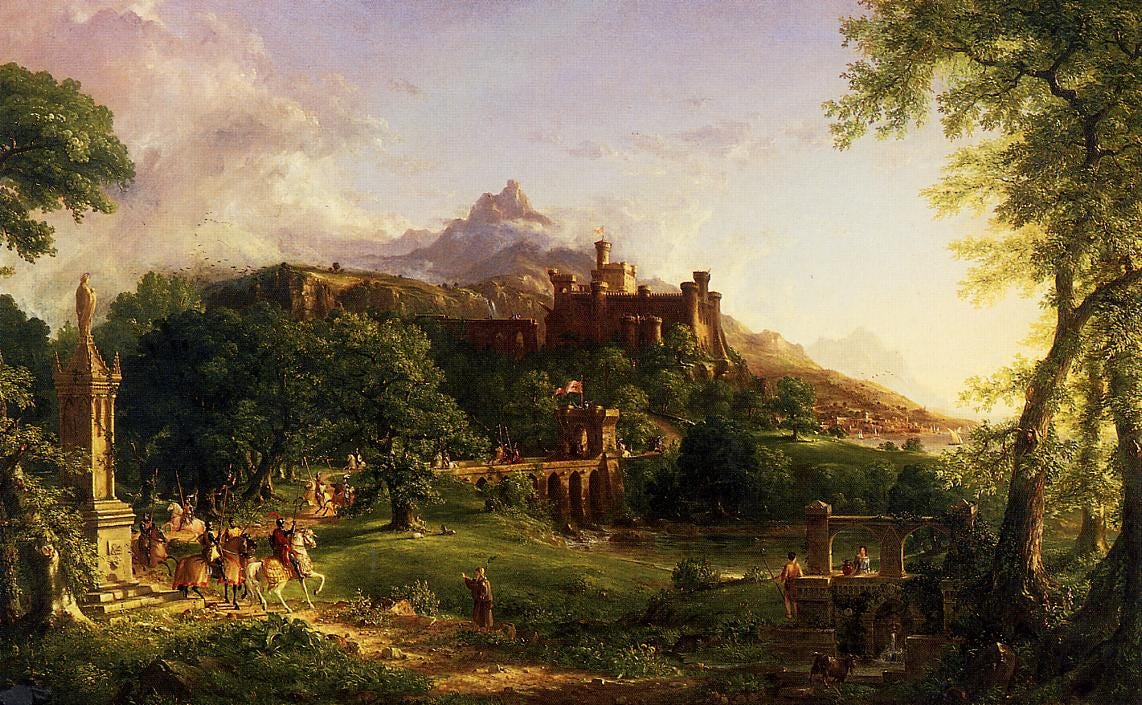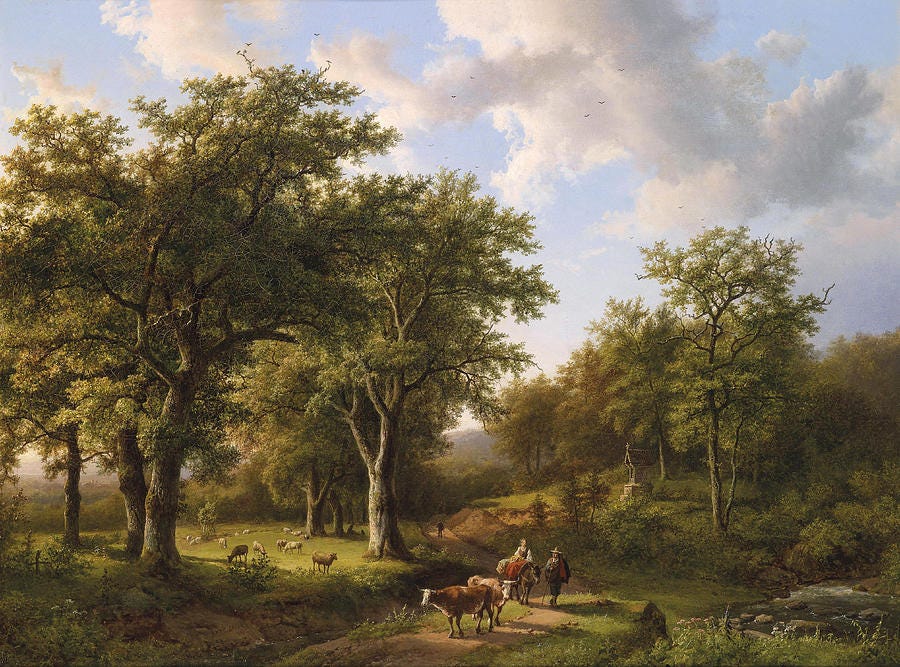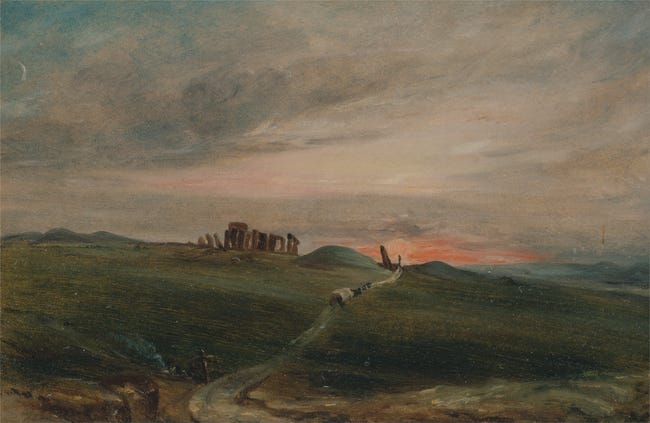“When Logres really dominates Britain, when the goddess Reason, the divine clearness, is really enthroned in France, when the order of Heaven is really followed in China—why, then it will be spring. But meantime, our concern is with Logres.” - C.S. Lewis, That Hideous Strength
With the West spiraling further every day into disarray and confusion, and with America in particular looking less and less like a land of truly “united states”, it seems worth asking the questions-
What is a country? What is a people?
For young to middle-aged westerners, with the borders of all the first world powers remaining essentially unchanged our lives, and the general “peace” remaining relatively stable, it’s easy for us to view the first world not as something that was created, but as something eternal.
To us in the 21st century, a “state” is primarily a government, with citizens. We think of ourselves as “Americans” not in an ethnic sense, but in the sense that we are citizens of the government body of America.
America is not its people, America is a state made up of smaller states, which are made out of counties. We simply inhabit the state- but America itself is a sort of metaphysical entity. Keep in mind that the modern nation-state is also not defined by its land, as its borders can change without the identity of the nation changing at all.
But this has not always been the way of things. There was a time before we thought of ourselves as “citizens” in the way we do now in the 21st century.
Benedict Anderson wrote a book in 1983 titled Imagined Communities. In it, Anderson detailed how he believed the modern idea of the nation-state was first created and found its way into the public consciousness.
He proposes that it was the industrial revolution, and specifically the printing press that allowed this change to occur. With the advent of the printing press, books began to be published in the vernacular, rather than in Latin. This allowed a common discourse to begin across an entire country, between groups from different localities that had perviously spoken different dialects. While dialects did not disappear, each country developed a common vernacular.
The English spoke and wrote English. The French spoke and wrote French.
This common discourse allowed these peoples to begin to “imagine” themselves as all part of a shared community, despite their geographical distance from one another. This created the modern nation state, which exists as a metaphysical thing in the minds of its citizens. (Important note- since this happened through language, there was a “limit”. Only those part of a closely enough related “folk” could participate in this).
Eventually, this is what led to the possibility of something like America existing. A gigantic, continent-spanning singular “country”, where the citizens generally consider themselves countrymen despite having nothing in common and living on opposite ends of a continent. We “imagine” America.
Anderson argues that this imagined social consciousness, coinciding with the end of the era of hereditary monarchal rule, is what led to the rise of the modern nation-state.
Fair enough so far, but you may see the issue here. These early-modern nation-states were made of up peoples that were culturally and genetically arguably the same. And in places where this was not true, those early nation-states struggled and often collapsed.
But in the modern West, we’ve gone beyond people from the same region and race considering themselves as part of a shared imagined community- in modern day America, anyone and everyone can become part of the imagined nation state.
This raises the topic of whether it’s even possible for a state to exist that is not (whether explicitly or in practice) an ethno-state.
I would say that only ethno-states can last more than a couple generations before splintering back into the original folk peoples.
You may be tempted to bring up something like the Roman empire as a counterpoint, but that doens’t work. Empires are not States and a Roman would not have shared in modern delusions as to what it means to be a citizen.
Rome was an empire, not a “nation”. It consisted of the capital city of Rome and all of its conquered lands. And it had “citizens” all over the world. But there was nothing resembling the mental delusion of the modern state.
It’s a popular claim that Rome did not care about race or religion or land of origin and that all could be “citizens”. This is only a sort of technical truth. A “citizen” of Rome in conquered Gaul did not have any idea that he was somehow metaphysically a “Roman” in the sense that he was now somehow Italian. He was “Roman” in the sense that he was subject to the empire. These are not the same thing.
“Citizen” to the Romans meant something more like “subject”, but now it means some sort of intangible metaphysical identity that can be converted on anyone by the state, no matter who they are, as long as they become part of the “imagined community”.
Clearly, modern nation-states have lost the plot.
But that’s not exactly what I’m thinking about today. I want to think about how we thought of ourselves before the modern nation-state existed. What is a land? What is a people?
Pre-modern humans must have considered themselves as something.
Until very, very recently in human history, there has only really been one way that people have identified themselves and with each other.
Folk
Before there was nationalism, there were folklands.
Traditionally, lands have been defined by their people- not the other way around. They have certainly not been defined by their “government body”.
A folk is just a large family. In time, those families grow into clans, and then tribes, and then minor “nations” in the senes of a people. This is the basis for all original lands and government- they are simply ways to organize an ever growing folk.
Even the original “nation-states” were really just an evolution of the folk state. It would have been unthinkable for the early political theorists to imagine a nation without an ethnic identity. Nationalism was originally intended as a way to strengthen folk identity, not weaken it.
To understand this you have to think back to before even the Middle Ages. Because a Folkland cannot be defined simply as the land ruled over by a certain king or emperor. No, “folk” existed even before the middle ages saw the rise of kings. And the kings in the Middle-ages were aware of this, he saw himself as ruling over different folks, he did not think that by nature of his rule his subjects all somehow became one.
Again, I want to stress that this article is not about politics or government.
It is that I believe that almost everyone on Earth, whether they realize it or not, primarily defines themselves by their folk, not their citizenship.
We can see this with the attitudes of immigrants to the West, race -folk- transcends national citizenship. They may consider themselves citizens of their new homes, but not for a second do they abandon or supplant their racial identity. It is only their western hosts that hold this delusion.
We saw this in pre civil war America, when southern men knew their loyalty lay first to their land of birth, their Folkland, not the larger nation-state.
We can see this when modern Americans are told that ALL ARE WELCOME, and all the descendants of the old-stock founders know that something is very wrong. We all know in our hearts that America was meant to be, and in fact was at one time, a new folkland.
The perfect example of this idea of a folk land can be found in C.S. Lewis’ novel That Hideous Strength.
In it, Lewis explains the difference between the modern nation-state of “Britain” and the primordial folkland of “Logres”.
Logres is the mythical, metaphysical “true” realm of Pre-Saxon Britain, the realm that King Arthur is prophesied to restore upon his return. It represents the underlying identity of the land and people that cannot ever be destroyed, that is not affected by cultural change or the tides of politics. It could be compared to the American South’s “Dixie”, or in Scandinavia, “Hyperborea”.
In the novel, Logres exists and operates alongside modern England, protecting the realm from evil. Essentially, Logres is a realm that lives in the hearts and minds of its people.
I’m paraphrasing, but the idea in the book is that Logres lives as long as there is one man who’s spirit still belongs to it.
And this is the core of what a folk is and how their lands are defined.
In terms of the UK, the modern parliament, the modern British government are completely irrelevant to the folk identity of the English. The Heptarchy, or Logres (no Germanic-Celtic infighting please) exists in the hearts and minds of all true Englishmen, even if there were only one left alive today.
Lewis makes an interesting point that every people on Earth have their own Logres, their own underlying truth or identity that makes them who they are and binds them together.
This is true.
The modern nation-state United States of America may be an unrecognizable cesspool, but there are places where the true America still lives. America still lives underneath the murk of Washington D.C.
The south was reconstructed, but you can still find places and people that belong more to “Dixie” than to the modern state. Alabama is still called the “heart of Dixie” for a reason.
We see this when 100 years after a land is conquered there will often be a revolution, for the nation-state cannot supplant the folkland in the minds of the conquered people.
(As a side note, this is why I’m generally against empire, as it is unnatural for multiple folk peoples to be ruled by the same man or government.).
So in conclusion, while I generally support monarchy as an idea, in reality a “nation” will only ever work if it is a Folk nation. A place set aside for one people, and ruled by one of their own.
Folk is the most important identity we have. Any other identity, or any form of government, only exists to strengthen this.
A people is a family, a folk. It is not your country, government, or even the land you dwell in.
Any government that supplants this is your enemy and is seeking your destruction.
So if you are one of those in the West that still holds on to the soul of your Folkland, whichever one that may be, hold on to it. It it through your soul that it lives.
God Bless.







Great read. I always identify as English rather that British. What’s strange is how British seems to have replaced English. Go to Scotland and you’ll see Scottish flags and people will identify as Scottish, go to Wales and it’s the same. You’ll even see Cornish flags in Cornwall. But you’ll struggle to find an English flag in England unless it relates to football. (And glad you’re reading the Space Trilogy).
Very good stuff. I'm glad to see other people using the term "folk", and rejecting the idea that the folk is derived from the state or the country.